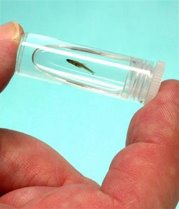AP Wednesday, 25 January 2006, 06:32 GMT BANGKOK, Thailand - Scientists have discovered the world's smallest fish on record in an acidic peat swamp in Indonesia, with a see-through body and a head that is unprotected by a skeleton, researchers said Wednesday.
Mature females of the Paedocypris progenetica, a member of the carp family, only grow to 7.9 millimeters (0.31 inches) and the males have enlarged pelvic fins and exceptionally large muscles that may be used to grasp the females during copulation, researchers wrote in the Proceedings of the Royal Society, published Wednesday by the Royal Society in London.
"This is one of the strangest fish that I've seen in my whole career,' said Ralf Britz, zoologist at the Natural History Museum in London, who helped analyze the fish's skeleton. "It's tiny, it lives in acid and it has these bizarre grasping fins. I hope we'll have time to find out more about them before their habitat disappears completely."
The previous record for small size, according to the Natural History Museum in London, was held by an 8-millimeter species of Indo-Pacific goby.
The new fish was discovered on Sumatra island by fish experts Maurice Kottelat from Switzerland and Tan Heok Hui from the Raffles Museum of Biodiversity Research in Singapore. They were working with colleagues from Indonesia and with Kai-Erik Witte from the Max Planck Institute in Germany.
"You don't wake up in the morning and think today we will find the smallest fish in the world," Kottelat told The Associated Press in a telephone interview from his home in Switzerland.
He said the record of finding the world's smallest fish was not important, preferring to focus on what he said was "scientifically significant."
"What's important is finding a complete vertebrae in a body so small," he said.
Kottelat said he first came across the fish in 1996, but originally misidentified it as a member of an already existing species. "But then we realized this one was different."
According to the researchers, the fish live in dark, tea-colored water with an acidity of ph 3, at least 100 times more acidic than rainwater. Swamps like this were once thought to harbor very few animals, but recent research has revealed that they are highly diverse and home to many species that occur nowhere else.
Peat swamps are under threat in Indonesia from fires lit by plantation owners and farmers as well as unchecked development and farming. Several populations of Paedocypris have already been lost, researchers say, according to the Natural History Museum.
Associated Press writer Bradley S. Klapper in Geneva contributed to this report
possible segues: size does matter...; in other news...; are there plenty of fish in the sea...; the dangers of holding on loosely...
BBC Tuesday, 17 January 2006, 14:38 GMT
By Richard Black
Environment Correspondent, BBC News website, Darwin
Whale sharks spotted off the coast of Australia are getting smaller, researchers have said.
In a decade the average size recorded by observers has shrunk from 7m to 5m.
Whale sharks, the world's largest fish, are caught for food in some east Asian countries and Australian researchers suspect this is causing a decline.
"Now, if you consider that the sharks probably aren't sexually reproductive or mature until they're 6 or 7m long - that's a very worrying sign."
Whale sharks (Rhincodon typus) are filter feeders, eating small marine organisms such as krill.
They can live for up to 150 years, attaining lengths of more than 15m, and are believed to reach sexual maturity around the age of 30.
Under the IUCN Red List of threatened species, they are categorised as "vulnerable" to extinction.
"Whale sharks, like many other shark species, are highly vulnerable to over-exploitation due to their long lifespan and low reproductive rate," commented Callum Roberts, of York University in the UK, who has researched whale sharks extensively in the Caribbean.
Finding migration routes could help pinpoint areas where they are being caught.
"Many of the people doing the fishing are just local villagers with no other option," said Mark Meekan.
Longer term objectives of the Aims programme include finding out more about the life cycle of the whale shark.
The biggest mystery concerns breeding and reproduction; males and females live in largely segregated communities, but must come together somewhere to breed.


